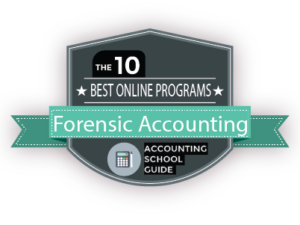
According to a recent study by the Association of Certified Fraud Examiners, the “typical organization loses 5% of revenues in a given year as a result of fraud,” which amounts to over $6 billion in losses. The most affected industries are banking and financial services, government and public administration, and manufacturing industries, but no industry or organization is exempt. Mining and wholesale trade have the fewest cases but the largest median losses at $500,000 and $450,000, respectively.
Of course, fraud has always been a problem. The difference now is that it’s more difficult to detect and prevent, and the stakes are higher than ever.
Forensic accountants work to protect against fraud, but provide a services in a number of other fields as well, including bankruptcy and insurance. In an accounting sector which the Bureau of Labor Statistics projects to grow 10% over the next decade, forensic accountants earn a median annual income of 65K. Experienced professionals can earn six figures.
Still, to break into this highly competitive job market, you’ll need formal training and a lot of hands-on learning. A bachelor’s provides foundational coursework, but mid- to senior-level jobs require certification, for which you’ll need a master’s. Below, we’ve ranked the best online master’s degrees in forensic accounting, as well as a few unique programs that prepare students for similar roles. Review coursework, specializations, and distinguishing features for each, and find the best degree for your needs!
1) Liberty University
![]()
Founded in 1971, Liberty University is a private Christian school with 100,000 students enrolled in online courses. A global leader in distance education, Liberty’s online programs are designed for a range of working professionals, adult learners, and non-traditional students, featuring affordable tuition rates and hybrid, intensive, and blended delivery opportunities. Further, the university’s generous transfer policy allows students to waive credits through previous academic course work, work/life experience, MOOC certifications, prior-learning examinations, military service, and/or portfolio work. A low student-to-faculty ratio fosters Liberty’s tight-knit community, with a third of classes having fewer than 20 students.
Liberty offers an online MS in Forensic Accounting that consists of 30 credit hours. Core requirements include Business Law for
Accountants, Cost Accounting, Accounting Information Systems, Tax Research & Jurisprudence, Auditing, and Ethics, among others. From there, students complete the forensic cognate with studies in Corporate Governance & Fraudulent Financial Reporting, Fraud Examination, and Information Technology & Fraud. All courses deliver in accelerated 8-week blocks, and full-time students can complete the degree in as little as 1.5 years. Some coursework may assist students sitting for the Certified Public Accountant (CPA) Exam, and the program is accredited by the Accreditation Council for Business Schools and Programs.
- Homepage
- Tuition Per Credit: $565
2) Southern New Hampshire University
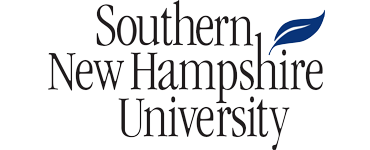
Southern New Hampshire University, founded in 1932, is a worldwide leader in online education, with 70,000 online students and 200 online programs. US News ranks SNHU 1st in the nation for innovation, and Fast Company, The Chronicle of Higher Education, and New Hampshire Business Review have all recognized the university for its forward-thinking education model. With a 15:1 student-to-faculty ratio, SNHU combines the resources of a large research institution with the small, intimate setting of a liberal arts school. Over sixty percent of classes contain less than 20 students.
Southern New Hampshire’s online MS in Forensic Accounting includes coursework in Fraud Prevention and Detection, Situational Ethics in Accounting, Corporate Financial Management, Federal Income Tax, Financial Reporting, and more. A capstone provides the program with a hands-on component, and allows students to demonstrate mastery of material. On a full-time schedule (two 10-week course blocks per semester) students can complete the degree in as little 15 months, and all SNHU courses are designed for maximum flexibility, including 24/7 access. The program aligns with the Content and Skill Specification Outlines (CSOs/SSOs) set by the American Institute of Certified Public Accountants (AICPA), and is accredited by the NEASC and ACBSP.
- Homepage
- Tuition Per Credit: $627
3) Florida Atlantic University

Founded in 1961, Florida Atlantic University is a public institution with a total enrollment of about 30,000, including 5,000 graduate students. FAU appears on academic rankings by US News, Princeton Review, Forbes, and Washington Monthly, among other publications, and the Carnegie Foundation recognizes the school’s research programs. With a 24:1 student-to-faculty ratio, Florida Atlantic combines the resources of a large institution with individualized instruction of a smaller school. A third of all classes have fewer than 20 students.
Florida Atlantic offers a unique, online Executive Master of Accounting with a concentration in Forensic Accounting, which can be completed in 2 years and includes customization options to let students tailor the degree to areas of professional interest. In particular, graduates will leave the program with a solid theoretical and practical knowledge of fraud investigation and prevention, litigation support, valuation, money-laundering investigation, and other types of criminal investigation. All coursework is designed for maximum flexibility to accommodate working professionals and adult learners, and students receive comprehensive academic service and 24/7 tech support. The program is accredited by the AACSB.
- Homepage
- Tuition Per Credit: $1,024
4) West Virginia University

West Virginia University, founded in 1876, has a total enrollment of 28,500 and is ranked among the top 100 public schools in the country. US News places WVU’s online programs on a half-dozen rankings, and Washington Monthly and Forbes have also highlighted the university. With a 19:1 student-to-faculty ratio, WVU fosters a vibrant learning community alongside extensive research resources which have earned the school recognition from the Carnegie Foundation. Nearly forty percent of classes have fewer than 20 students and less than 18% have 50.
West Virginia offers an online MS in Forensic & Fraud Examination. Core requirements include Forensic and Fraud Examination Skills, Fraud Investigation, Fraud Data Analysis, Fraud Criminology/Legal Issues, Advanced Fraud Investigation, and Advance Analytical Techniques. From there, students complete a 4-course module that borrows from the school’s MBA curriculum, including studies in financial statements, decision analysis, and business ethics. To provide students with a real-world component, the degree also requires two case examinations and two examination engagements that students complete as a team. Two 2-day residencies are also required (usually Thursday, Friday and/or Saturday). The degree is accredited by the AACSB.
- Homepage
- Tuition Per Credit: $993
5) La Salle University

La Salle University is a private Catholic university in Philadelphia, Pennsylvania, with a total enrollment of about 6,000. Founded in 1863 by the Institute of the Brothers of the Christian Schools, La Salle ranks among the best schools in the region (34th according to US News) and has also been recognized for its veteran support services and tuition value. The 11:1 student-to-faculty supports a tight-knit learning community, combining collaborative education opportunities with tailored instruction from top faculty. Over 45% of classes have fewer than 20 students.
La Salle offers a 36-credit online MS in Economic Crime Forensics that includes core courses in Fraud Examination, Corporate Ethics and Compliance, Litigation Support Practices and Procedures, Financial Fraud, Occupational Fraud, Information Security, and more. From there, students have the opportunity to choose one of two specialization tracks in Corporate Fraud or Network Security, giving the degree a customization component. Upon completion of the master’s, students will be prepared to: propose business, ethics, and professional standards to corporate leadership; assess corporate cultures related to the global markets; design and implement plans and processes to prevent and deter economic crime; and select and prepare evidence for litigation. Courses deliver in accelerated 8-week blocks.
- Homepage
- Tuition Per Credit: $835
6) Western New England University
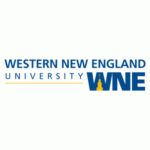
Founded in 1919, Western New England University is a private institution in Springfield, Massachusetts, with a total enrollment of about 3,800, including students from 37 states and 25 foreign countries. The 12:1 student-to-faculty ratio promotes a highly collaborative, intimate education setting, and top-ranked faculty tailor lessons to individual students’ needs. In addition to accreditation by the New England Association of Schools and Colleges, WNEU is a member of the Association of American Colleges, the National Association of Independent Colleges and Universities, and the Association of Independent Colleges and Universities of Massachusetts.
Western New England’s online Master’s in Accounting (MSA) is a 30-credit degree designed to prepare students for variety of careers, including at public accounting firms, industrial companies, financial institutions, and government agencies. Core requirements include Cost-Based Decision-Making, Municipal and Fund Accounting, Corporate and Partnership Tax, Auditing and Assurance Services, Accounting Theory & Contemporary Issues, Business Analysis and Valuation, and Managerial Finance. From there, students complete a 9-credit concentration in Forensic Accounting/Fraud Investigation that trains students in raud investigation accounting, forensic accounting, and litigation support. All coursework is designed for maximum flexibility and delivered via an online learning platform that includes streamlined communications, group discussion boards, and more. The master’s is accredited by AACSB International.
- Homepage
- Tuition Per Credit: $824
7) Stevenson University
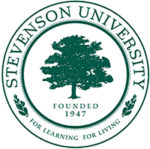
Stevenson University, founded in 1947, is a private institution with a total enrollment of about 4,200. US News ranks Stevenson among the best schools in the North region, and offers additional high marks for value and veteran support services. The 14:1 student-to-faculty ratio fosters a tight-knit educational setting that combines the best of a small liberal arts community with a larger school’s dynamic, vibrant atmosphere. Nearly 70% of classes have less than 20 students, and none have more than 49. Over 90% of alumni report being employed or pursuing advanced degrees within six months of graduation.
Stevenson offers an online Master’s in Forensic Studies that consists of 36 credits. Core requirements include Foundations of Justice, Evidence, Forensic Journal Research and Review, Investigative Techniques (Interviewing and Physical Evidence), and a unique mock trial capstone that provides students with real-world experience in courtroom setting. Students interested in forensic accounting then complete three Forensic Accounting electives, such as File Systems Forensic Analysis, White Collar Crimes, or Auditing. Courses are built to accommodate a wide variety of schedules and focus on in-demand skills development. Students support services include tech assistance, career services, and more.
- Homepage
- Tuition Per Credit: $670
8) Bay Path University
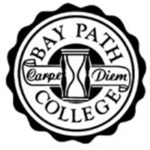
Founded in 1897, Bay Path University is a private institution with a total enrollment of about 3,200, evenly divided between undergraduate and graduate students. (Undergrad is all-female, graduate is co-ed.) A member of the Cooperating Colleges of Greater Springfield, BPU is ranked among the best schools in the North region by US News. Forbes has highlighted the school’s financial viability, and the school ranks eighth overall on the Chronicle of Higher Education’s list of fastest growing colleges in America from 2002-2012. With an 11:1 student-to-faculty ratio, nearly 90% of classes have fewer than 20 students, creating an intimate and vibrant educational community.
Bay Path offers an online Master’s in Forensic Accounting that consists of 30 credits. Courses cover Government & Nonprofit Accounting, Controllership, IT for Accountants, Fraud Examination, Forensics Accounting/Systems, and Contemporary Issues in Accounting, among others. Studies are customized for state-specific CPA requirements, and the program’s highly flexible, accelerated delivery options allow students to complete the master’s in 8, 12, or 24 months; entry dates are available in April, May, July, September, and November. All accounting courses emphasize a hands-on, practical learning model that combines experiential learning and individualized instruction. Student support services include mentoring, tutoring, library resources, and career services.
- Homepage
- Tuition Per Credit: $830
9) Rider University
![]()
Founded in 1865, Rider University is a private institution with a total enrollment of about 5,100, including 1,000 graduate students. US News ranks Rider in the North region’s top 35 schools on its overall list and best value list. Committed to a student-centered education as well as high-quality instruction and experiential opportunities, Rider maintains an 11:1 student-to-faculty ratio. Nearly half of classes have fewer than 20 students, and just 1% have 50 or more.
Rider’s Master of Accountancy degree offers a concentration in Forensic Accounting that requires 30 credits. Core courses include Federal Taxes, Analysis of Accounting Data, Issues in Financial Reporting, and International Dimensions of Accounting. Forensic Accounting majors then complete Fraud and Forensic Accounting, Fraud Detection and Deterrence, and an elective in either Business Valuation, Business Intelligence Technology and Data Mining, or Auditing Problems and Practice. To gain valuable hands-on experience, Rider helps students coordinate accounting internships in New York, New Jersey, and Pennsylvania. Most instructors are full-time faculty with doctorate degrees and professional experience. The master’s is accredited by the AACSB International.
- Homepage
- Tuition Per Credit: $1,100
10) Carlow University
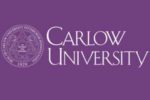
Founded in 1929, Carlow University is a private institution in Pittsburgh with a total enrollment of about 2,250. US News ranks Carlow among the best colleges and universities in the region. The university’s mission reflects its Catholic background, emphasizing social justice, ethical leadership, and service. Meanwhile, coursework and curricula prepare students for today’s high-tech, sharing economy. With a 12:1 student-to-faculty ratio, classes combine individualized instruction and collaborative learning; over 75% have fewer than 20 students.
Carlow offers a 30-credit online Master’s in Fraud and Forensics — the first of its kind — designed by licensed experts from accounting, law enforcement, government and corporations. Sample courses include White Collar Crime, Fraud Prevention and Ethics, Scientific Inquiry in Fraud & Forensics, Legal Elements of Fraud, Financial Statement Examination, and Audit Procedures for Detecting Fraud. Thanks to hyper-accelerated courses, students can complete the master’s in as little as a year, and for those interested, Carlow also offer a micromaster’s degree in the field. In addition to a partnership with the Association of Certified Fraud Examiners, the degree fulfills requirements for the CFE exam and meets Pennsylvania’s 150-hour requirement for the CPA exam.
- Homepage
- Tuition Per Credit: $850
